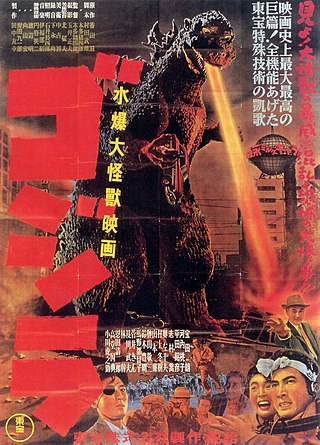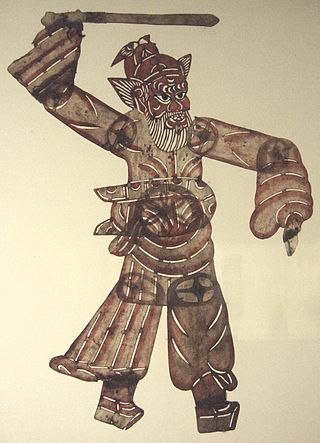Related Research Articles

Hentai is a style of Japanese pornographic anime and manga. In addition to anime and manga, hentai works exist in a variety of media, including artwork and video games.

Guanyin is a common Chinese name of the bodhisattva associated with compassion known as Avalokiteśvara. Guanyin is short for Guanshiyin, which means "[The One Who] Perceives the Sounds of the World". Due to sociogeographical factors, Guanyin can be historically depicted as genderless or adorning an androgynous apprentice. On the 19th day of the sixth lunar month, Guanyin's attainment of Buddhahood is celebrated. Guanyin has been appropriated by other religions, including Taoism and Chinese folk religion.

Charlie Chan is a fictional Honolulu police detective created by author Earl Derr Biggers for a series of mystery novels. Biggers loosely based Chan on Hawaiian detective Chang Apana. The benevolent and heroic Chan was conceived as an alternative to Yellow Peril stereotypes and villains like Fu Manchu. Many stories feature Chan traveling the world beyond Hawaii as he investigates mysteries and solves crimes.

A bento is a Japanese-style single-portion take-out or home-packed meal, often for lunch, typically including rice and packaged in a box with a lid. Outside Japan, similar meals are common in other East and Southeast Asian culinary styles, especially within Chinese, Korean, Singaporean, Taiwanese cuisines and more, as rice is a common staple food in the region. The term bento is derived from the Chinese term biandang, which means "convenient" or "convenience".

The Yellow Peril is a racist color metaphor that depicts the peoples of East and Southeast Asia as an existential danger to the Western world.

In traditional Japanese folklore a kappa—also known as kawatarō, komahiki, with a boss called kawatora or suiko—is a reptiloid kami with similarities to yōkai. Kappa can become harmful when not respected as gods. Accounts typically depict them as green, human-like beings with webbed hands and feet and turtle-like carapaces on their backs. A depression on the head, called a "dish", retains water, and if this is damaged or its liquid is lost, a kappa becomes severely weakened.

Bondage in BDSM is the activity of tying or restraining people using equipment such as chains, cuffs, or collars for mutual erotic pleasure. According to the Kinsey Institute, 12% of females and 22% of males respond erotically to BDSM.

Tokusatsu is a Japanese term for live-action films or television programs that make heavy use of practical special effects. Credited to special effects director Eiji Tsuburaya, tokusatsu mainly refers to science fiction, war, fantasy, or horror media featuring such technology but is also occasionally dubbed a genre itself. Its contemporary use originated in the Japanese mass media around 1958 to explain special effects in an easy-to-understand manner and was popularized during the "first monster boom" (1966–1968). Prior to the monster boom, it was known in Japan as tokushu gijutsu or shortened tokugi.

Chinese Peruvians, also known as tusán, are Peruvian citizens whose ancestors came from China.
Ching chong, ching chang chong, and chung ching are ethnic slurs used to mock or imitate the Chinese language, people of Chinese ancestry, or other people of East Asian descent perceived to be Chinese. The term is a derogatory imitation of Mandarin and Cantonese phonology. The phrases have sometimes accompanied assaults or physical intimidation of East Asians, as have other racial slurs or imitation of Chinese.

Ronald Toshiyuki Takaki was an American academic, historian, ethnographer and author. Born in pre-statehood Hawaii, Takaki studied at the College of Wooster and completed his doctorate in American history at the University of California, Berkeley.
The Chinese in Hawaii constitute about 4.7% of the state's population, most of whom (75%) are Cantonese people with ancestors from Zhongshan in Guangdong. This number does not include people of mixed Chinese and Hawaiian descent. If all people with Chinese ancestry in Hawaii are included, they form about 1/3 of Hawaii's entire population. As United States citizens, they are a group of Chinese Americans. A minority of this group have Hakka ancestry.
The phrase "Sick man of Asia", or "Sick man of East Asia" first referred to Qing China in the late 19th and early 20th centuries which, experiencing internal divisions and social upheaval at the time, was taken advantage of by the great powers. It originates in a play on the concept of a "sick man of Europe".
Racism has been reflected in discriminatory laws, practices, and actions against racial or ethnic groups throughout the history of the United States. Since the early colonial era, White Americans have generally enjoyed legally or socially-sanctioned privileges and rights that have been denied to members of various ethnic or minority groups. European Americans have enjoyed advantages in matters of citizenship, criminal procedure, education, immigration, land acquisition, and voting rights.

Ang mo or ang moh is a descriptor used to refer to white people. It is used mainly in Malaysia and Singapore, and sometimes in Thailand and Taiwan. It literally means "red-haired" and originates from Hokkien, a variety of Southern Min.

Frank Chin is an American author and playwright. He is considered to be one of the pioneers of Asian-American theatre.
Stereotypes of East Asians in the United States are ethnic stereotypes found in American society about first-generation immigrants and their American-born descendants and citizenry with East Asian ancestry or whose family members who recently emigrated to the United States from East Asia, as well as members of the Chinese diaspora whose family members emigrated from Southeast Asian countries. Stereotypes of East Asians, analogous to other ethnic and racial stereotypes, are often erroneously misunderstood and negatively portrayed in American mainstream media, cinema, music, television, literature, video games, internet, as well as in other forms of creative expression in American culture and society. Many of these commonly generalized stereotypes are largely correlative to those that are also found in other Anglosphere countries, such as in Australia, Canada, New Zealand, and the United Kingdom, as entertainment and mass media are often closely interlinked between them.

Anti-Malay sentiment or Malayophobia refers to feelings of hostility, prejudice, discrimination or disdain towards Malay people, Malay culture, the Malay language or anything perceived as Malay.

Monster Hunter is a 2020 monster film written, directed, and produced by Paul W. S. Anderson, based on the video game series of the same name by Capcom. The film stars Milla Jovovich in her sixth outing together with Anderson, her husband. The other cast members include Tony Jaa, Clifford "T.I." Harris Jr., Meagan Good, Diego Boneta, Josh Helman, Jin Au-Yeung, and Ron Perlman. The film follows Artemis (Jovovich) and her loyal soldiers when they are transported to a new world, where they engage in a battle for survival against enormous monsters with incredible powers.

Demon hunter or demon slayer is a demonology-related historic occupation or folkloric character which specializes in killing demons, monsters, or undead creatures. A demon hunter typically is involved with a deity and angels, and they typically wield religious text, holy water, and relics.
References
- ↑ Xing, Jun (1998). Asian America Through the Lens: History, Representations, and Identities. Walnut Creek, CA: AltaMira Press. p. 162. ISBN 0-7619-9175-1. OCLC 39051806.
- 1 2 Zaloom, Shafia (2003). "Dirty Knees". In Kane, Pearl Rock; Orsini, Alfonso J. (eds.). The Colors of Excellence: Hiring and Keeping Teachers of Color in Independent Schools. New York: Teachers College Press. p. 26. ISBN 0-8077-4282-1. OCLC 53093570.
- ↑ Mansour, David (2005). From Abba to Zoom: A Pop Culture Encyclopedia of the Late 20th Century. Kansas City, MO: Andrews McMeel Publishing. p. 262. ISBN 978-0-7407-9307-3. OCLC 776997651.
- ↑ Ulen, Eisa. "8 Children's Nursery Rhymes That Are Actually Racist". Reader's Digest. Retrieved September 12, 2024.
- ↑ Pusey, Shirley Budd (2005). "Emily". Adoption Reunion Stories. Phoenix, AZ: Acacia Publishing. p. 143. ISBN 0-9762224-5-0. OCLC 61362752.
- ↑ Rhee, Michelle (2013). "Chapter 1". Radical: Fighting to Put Students First. New York: Harper. ISBN 978-0-06-220400-4. OCLC 825116527.
- ↑ Lee, Gregory B. (2003). Chinas Unlimited: Making the Imaginaries of China and Chineseness. Honolulu: University of Hawai'i Press. p. 45. ISBN 0-8248-2680-9. OCLC 51722034.
- ↑ Davis, Rebecca (December 5, 2020). "'Monster Hunter' Pulled From Chinese Cinemas Over Scene Said to Be Racial Slur". Variety. Retrieved December 5, 2020.